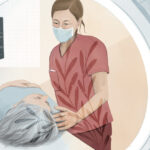Labs: what the pandemic can teach us
Labs: what the pandemic can teach us
The health crisis has forced significant changes in the organization of work in labs – changes that are calling into question the very core of the OPTILAB system. Before we all go back to normal and press the restart button, shouldn’t we at least take the time to think about these issues?
Right off the bat, there’s one glaring absurdity. Labs play a crucial role in fighting COVID-19, yet despite the premier’s expressions of gratitude and APTS efforts to get the message across, the government has failed to recognize this by providing our members with the financial compensation they clearly deserve.
Exposing OPTILAB’s flaws
One of the key things we learned from the pandemic is that we needed to shorten response times. To do this, it was necessary to decentralize the process of analyzing COVID-19 screening tests, bringing them closer to the population and basic care teams. First processed in a lab in Saskatchewan, then in public health labs, tests were so numerous that multiple service points were required. As a consequence, hub labs were quickly called in. When they proved insufficient, support was requested from a number of partner labs, and more of these will soon be involved as the population gradually emerges from confinement.
Equipment was required to meet the needs arising from the pandemic. In addition, all of the analyses handled in the microbiology sector had to be reorganized, since this is where most COVID-19 samples are analyzed. Unfortunately, this reorganization was at odds with the OPTILAB roll-out, which had centralized the most efficient equipment and the largest share of analyses in hub labs.
These changes in organization were possible because of the general slowdown in the health and social services system, and because many regular services had been withdrawn. If labs in the regions most affected by the pandemic had been working at full capacity, they would have been impossible. And even so, a number of lab clusters faced significant problems. The following examples highlight issues already raised by the APTS as matters of concern, in relation to problems with the OPTILAB roll-out.
- Bas-St-Laurent/Gaspésie lab cluster, Gaspésie extra-territorial partner labs: transportation problems and no Plan B – Because of COVID-19, samples could no longer be sent by bus (Expédibus) or plane (from Bonaventure airport). Lab cluster managers were forced to act quickly, setting up a private transportation system at the last minute. The system involves a number of stops – it can take as long as five days for samples to reach Rimouski. They may no longer be frozen when they arrive, in which case new samples have to be collected.
- Montréal – MUHC/Abitibi-Témiscamingue lab cluster: communication problems and remote management issues – The process of analyzing COVID-19 tests was chaotic because of the MUHC’s constantly changing procedures. Management difficulties were compounded by the fact that the two regions, widely separated geographically, face very different realities.
- Laval-Laurentides – Lanaudière lab cluster: using the private sector as Plan B – With major outbreaks in both the Laval and Lanaudière regions, the Laval hub lab was quickly swamped. Lab cluster managers’ Plan B was to send some samples to Hôpital Sainte-Justine and some to a private company, Caprion.
- Chaudière-Appalaches lab cluster: misallocation of lab resources – The Lévis hub lab decided to transfer gonorrhea and chlamydia analyses to the Rivière-du-Loup lab cluster in order to free up the facility for COVID-19 analyses. This was a dubious decision in that other labs within the Chaudière-Appalaches cluster could have taken the samples, while the Rivière-du-Loup lab, which is part of the Bas-St-Laurent/Gaspésie cluster, is dealing with work overload that employees can’t sustain.
The current situation
In the fourth month of the pandemic, the situation in labs is more worrying than ever. Québec is beginning its deconfinement and the health and social services system is getting back to normal, providing services that had previously been put on hold (particularly in operating facilities). And summer is almost here.
The vacation period has always involved work overload for our members in labs because of staff shortages. Rolling out the OPTILAB project increased the overload, making it untenable. This year, the return to normal life, combined with added COVID-19 analyses and the backlog accumulated as a result of redirected services and resources, is a highly worrisome cocktail for the health of our already exhausted members. While a number of labs have been able to hire staff and externs, needs are so great that some teams will simply not be able to keep up with demand.
Isn’t this enough to get the team in charge of OPTILAB to acknowledge the extent of the project’s weaknesses, and reconsider their plan? The answer, unfortunately, would seem to be no. From all accounts available to us, the OPTILAB roll-out, which had been halted, appears to have started up where it left off. Worse yet, while we thought our political leaders would reach the obvious conclusion and halt the projected construction of new hub labs, we now find the hub lab for the Montérégie cluster on the list of building projects that the government wants to fast-track.
When will the havoc wreaked by OPTILAB be acknowledged? Will it be when our members are completely burnt out, and working conditions have deteriorated to such an extent that it will be impossible for labs to attract a single new employee? Or when we find ourselves in the middle of a second wave of the pandemic, without the personnel to carry out all the analyses we will need?
In implementing OPTILAB, Minister Barrette was carrying out a plan to dismantle clinical laboratories. The impact of this project became fully apparent when the pandemic found its way into long-term care homes. Do the CAQ’s elected representatives want to blindly pursue Barrette’s work, or will they act responsibly and face reality? The APTS has no desire to just sit back and say “I told you so.” We want to be part of the solution. We urge Minister McCann to accept the hand extended by lab personnel and work with us to find long-lasting solutions that will benefit our members and the population.





